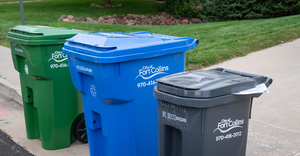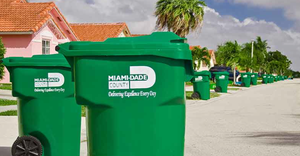Producer Responsibility is Good for Business and Good for Colorado
Colorado is poised to have one of the nation’s best recycling programs as it implements its best-in-class Extended Producer Responsibility (EPR) program. The newly released Circular Action Alliance (CAA) report charts a course towards raising the recycling rate to as high as 50% by 2035. This is all possible because the state passed HB24-1355, creating a producer responsibility program for recycling in Colorado.

Colorado is poised to have one of the nation’s best recycling programs as it implements its best-in-class Extended Producer Responsibility (EPR) program. The newly released Circular Action Alliance (CAA) report charts a course towards raising the recycling rate to as high as 50% by 2035. This is all possible because the state passed HB24-1355, creating a producer responsibility program for recycling in Colorado.
As two of the largest companies in America, along with 60+ members of The Recycling Partnership and with broad support across industry and the NGO community, we are committed to and invested in increasing recycling rates nationwide. Ensuring products and packaging from recycled materials helps enable reduced carbon emissions, less waste and demonstrates the high value of recycled materials for our industry. That’s good for customers, business as well as the environment. Extended producer responsibility (EPR) is a holistic system that creates powerful financial incentives for producers to transform their packaging portfolio and use less plastic. This is just plain good business sense that our employees, our customers, and our investors expect from us.
The producer responsibility program created by HB22-1355 will reshape the recycling landscape by providing recycling access to all Coloradans by extending curbside recycling services to an additional 500,000 households in municipalities and provide recycling services to 200,000 more in rural areas – homes currently devoid of such services. Local governments will no longer be responsible for funding recycling infrastructure and services, and residents will no longer be burdened with paying directly for recycling collection. Instead, the cost of recycling will be paid for by the companies that sell products in Colorado, including our own.
This program will also require no increased state spending. Globally, decades-old producer responsibility programs have shown that such programs do not lead to increased consumer prices at checkout, as the cost to participating companies amounts to mere fractions of a penny per product. HB24-1355, like producer responsibility programs elsewhere, will expand the recycling system and provide packaging manufacturers with increased availability of materials such as aluminum, paper, glass, and plastics. Today, many of those materials are sourced outside of the US. Producer responsibility will help grow domestic supply of recycled materials, reduce our reliance on global sources and encourage higher recycling rates domestically.
Besides, Colorado's economy is expected to benefit significantly from increased recycling. According to The Recycling Partnership's “Increasing Recycling Rates with EPR Policy,” report, effective producer responsibility programs could help recapture between $13 million and $91 million of economic value in states. Already, the Colorado producer responsibility program is drawing interest from those seeking to make significant investment in innovative recycling ventures, which we anticipate may help create thousands of new jobs for Coloradans.
With the publication of CAA’s report, we support the state of Colorado moving forward to implement HB22-1355, and with this producer responsibility program, advance recycling and build a strong circular economy. We are among 20 founding food, beverage, consumer goods retail companies who have been at the forefront of this critical legislation and look forward to supporting Colorado’s transition to the national economic leader in transforming how businesses design, utilize, and most importantly turn packaging back into valuable commodities in addition to reducing unnecessary packaging at source.
Editor's Note: Waste360 accepts thought leadership and opinion pieces. Submit your commentary and contributed articles to Editorial Director Stefanie Valentic at [email protected].
About the Authors
You May Also Like

.png?width=100&auto=webp&quality=80&disable=upscale)

.png?width=400&auto=webp&quality=80&disable=upscale)


